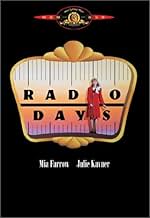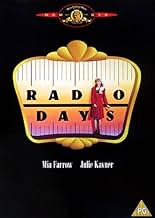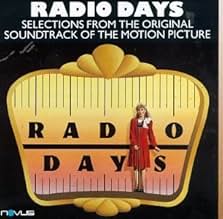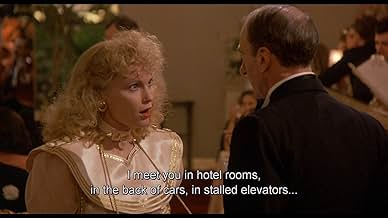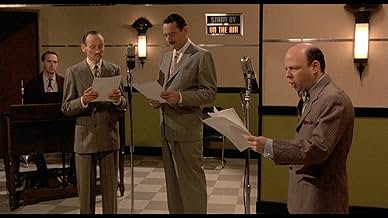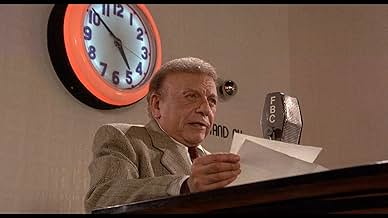ÉVALUATION IMDb
7,4/10
38 k
MA NOTE
Un regard nostalgique sur l'âge d'or de la radio axé sur une famille ordinaire et les différents interprètes de l'époque.Un regard nostalgique sur l'âge d'or de la radio axé sur une famille ordinaire et les différents interprètes de l'époque.Un regard nostalgique sur l'âge d'or de la radio axé sur une famille ordinaire et les différents interprètes de l'époque.
- Nommé pour 2 oscars
- 3 victoires et 10 nominations au total
Mick Murray
- Avenger Crook
- (as Michael Murray)
Renée Lippin
- Ceil
- (as Renee Lippin)
Avis en vedette
RADIO DAYS is one of Woody Allen's most underrated comedies, a fond look back to the days of radio and its effects on his family.
Set against long-forgotten radio programs, hit songs, and the coming of World War II, we get two narrative threads. The Rockaway family dealing with everyday issues in a series of vignettes, and the fictional life of Sally White (Mia Farrow) as she rises from cigarette girl to glittering radio star.
The cast is excellent. Farrow has a solid role as the Brooklyn girl with the Judy Holliday voice who battles her way toward upward mobility. Julie Kavner and Michael Tucker are terrific as the parents. Dianne Wiest is sweet as Aunt Bea, always on the lookout for true love. Seth Green plays Woody as a kid. Diane Keaton and Kitty Carlisle show up as singers. Josh Mostel and Renee Lippin are hilarious as the aunt and uncle. Wallace Shawn has a funny bit as the "Masked Avenger." Other notables include Richard Portnow as Si, Kenneth Mars as the rabbi, Larry David as the crazed neighbor, Jeff Daniels and William H. Macy as radio actors, Tony Roberts as the game show host, Danny Aiello as the gangster, and a special kudo for the hilarious Gina DeAngelis as his mother.
Highlights include Bea's date on the night of Orson Welles' famous radio program about a Martian invasion, and the poignant episode about the live radio coverage of a girl who's fallen down a well. The film also takes nostalgic looks at radio serials, quiz programs, and comedy shows.
The film perfectly captures the middle class neighborhood of Allen's youth. The interiors are beautifully done (Santo Loquasto), and very memorable is the awe-inspiring visit to Radio City Music Hall with its dimmed lights, lush carpets, and warm red-and-gold tones.
There is also a parade oh hit songs of the day that include "September Song," "Tico Tico," "Mairzy Doats," "South American Way," "Pistol Packin' Mama," "If I Didn't Care," and so many others.
A final word for the many actors and actresses in small parts who make this movie feel so right. Many have walk-ons or have only a line or two but they add the perfect touch and help recreate Woody Allen's beloved New York City.
Set against long-forgotten radio programs, hit songs, and the coming of World War II, we get two narrative threads. The Rockaway family dealing with everyday issues in a series of vignettes, and the fictional life of Sally White (Mia Farrow) as she rises from cigarette girl to glittering radio star.
The cast is excellent. Farrow has a solid role as the Brooklyn girl with the Judy Holliday voice who battles her way toward upward mobility. Julie Kavner and Michael Tucker are terrific as the parents. Dianne Wiest is sweet as Aunt Bea, always on the lookout for true love. Seth Green plays Woody as a kid. Diane Keaton and Kitty Carlisle show up as singers. Josh Mostel and Renee Lippin are hilarious as the aunt and uncle. Wallace Shawn has a funny bit as the "Masked Avenger." Other notables include Richard Portnow as Si, Kenneth Mars as the rabbi, Larry David as the crazed neighbor, Jeff Daniels and William H. Macy as radio actors, Tony Roberts as the game show host, Danny Aiello as the gangster, and a special kudo for the hilarious Gina DeAngelis as his mother.
Highlights include Bea's date on the night of Orson Welles' famous radio program about a Martian invasion, and the poignant episode about the live radio coverage of a girl who's fallen down a well. The film also takes nostalgic looks at radio serials, quiz programs, and comedy shows.
The film perfectly captures the middle class neighborhood of Allen's youth. The interiors are beautifully done (Santo Loquasto), and very memorable is the awe-inspiring visit to Radio City Music Hall with its dimmed lights, lush carpets, and warm red-and-gold tones.
There is also a parade oh hit songs of the day that include "September Song," "Tico Tico," "Mairzy Doats," "South American Way," "Pistol Packin' Mama," "If I Didn't Care," and so many others.
A final word for the many actors and actresses in small parts who make this movie feel so right. Many have walk-ons or have only a line or two but they add the perfect touch and help recreate Woody Allen's beloved New York City.
Radio Days (1987)- written, directed, and narrated by Allen:
What a beautiful, kind, gentle, ironic, warm, sentimental (in a very good way and yes, I am talking about Woody Allen's movie, that's right) yet perfectly balanced delight. It is a series of sketches about young Joe (young Allen, of course, played by Seth Green - that was a surprise), an adolescent in Brooklyn, NY during 1930s-1940s who was passionately in love with radio which was a king. The film is a tribute to the magical radio days and the myths and legends about radio personalities, the memory of a grown man who never forgot where he came from, the love letter to his always fighting and arguing ("I mean, how many people argue over oceans?") but loving relatives and a very funny comedy (the way only Allen's comedy can be). It is the film where pretty like a doll and painfully naive Sally (Mia Farrow) asks who Pearl Harbor is? Where gorgeous Diane Keaton sings and Diane Wiest, his beloved Aunt Bea never gives up hope of one true love. He never told us if she found it...
"I never forgot that New Year's Eve when Aunt Bea awakened me to watch 1944 come in. I've never forgotten any of those people or any of the voices we would hear on the radio. Though the truth is, with the passing of each New Year's Eve, those voices do seem to grow dimmer and dimmer."
The Radio days are gone but thanks to Allen, the voices of the times passed are still clear and sound and they always will be.
9/10
What a beautiful, kind, gentle, ironic, warm, sentimental (in a very good way and yes, I am talking about Woody Allen's movie, that's right) yet perfectly balanced delight. It is a series of sketches about young Joe (young Allen, of course, played by Seth Green - that was a surprise), an adolescent in Brooklyn, NY during 1930s-1940s who was passionately in love with radio which was a king. The film is a tribute to the magical radio days and the myths and legends about radio personalities, the memory of a grown man who never forgot where he came from, the love letter to his always fighting and arguing ("I mean, how many people argue over oceans?") but loving relatives and a very funny comedy (the way only Allen's comedy can be). It is the film where pretty like a doll and painfully naive Sally (Mia Farrow) asks who Pearl Harbor is? Where gorgeous Diane Keaton sings and Diane Wiest, his beloved Aunt Bea never gives up hope of one true love. He never told us if she found it...
"I never forgot that New Year's Eve when Aunt Bea awakened me to watch 1944 come in. I've never forgotten any of those people or any of the voices we would hear on the radio. Though the truth is, with the passing of each New Year's Eve, those voices do seem to grow dimmer and dimmer."
The Radio days are gone but thanks to Allen, the voices of the times passed are still clear and sound and they always will be.
9/10
Radio Days (1987) was written and directed by Woody Allen. The movie is set during the "golden years of radio," when radio programs, listened to at home, were an important aspect of American entertainment.
The film is narrated by Woody Allen, and is a nostalgic--and possibly autobiographical--look at the childhood of a young boy growing up in Rockaway, Queens. Allen grew up in Brooklyn, but the culture and customs of lower-middle class Jews in Rockaway would have been similar to those that Allen probably witnessed in Brooklyn.
The movie is set in the late 1930's and early 1940's. Surprisingly, World War II doesn't hold a prominent place in the film. Although the war was thousands of miles away, no aspect of life in the U.S. was untouched by it. Allen chose to concentrate on other matters--failed hopes, unfulfilled romances, and family bickering.
Despite these negative aspects of day-to-day life, the film projects a cheery, upbeat attitude. After all, it was a time when someone who looked like Wallace Shawm could star as radio's "Masked Avenger." Woody's subdued narrative lets us know that he loved those around him and was loved by them in turn.
Life wasn't perfect, but it could have been worse, and who knew what good things the future might bring.
We saw Radio Days on DVD. It probably would work somewhat better on the large screen, but it's worth seeking out and seeing in any format.
The film is narrated by Woody Allen, and is a nostalgic--and possibly autobiographical--look at the childhood of a young boy growing up in Rockaway, Queens. Allen grew up in Brooklyn, but the culture and customs of lower-middle class Jews in Rockaway would have been similar to those that Allen probably witnessed in Brooklyn.
The movie is set in the late 1930's and early 1940's. Surprisingly, World War II doesn't hold a prominent place in the film. Although the war was thousands of miles away, no aspect of life in the U.S. was untouched by it. Allen chose to concentrate on other matters--failed hopes, unfulfilled romances, and family bickering.
Despite these negative aspects of day-to-day life, the film projects a cheery, upbeat attitude. After all, it was a time when someone who looked like Wallace Shawm could star as radio's "Masked Avenger." Woody's subdued narrative lets us know that he loved those around him and was loved by them in turn.
Life wasn't perfect, but it could have been worse, and who knew what good things the future might bring.
We saw Radio Days on DVD. It probably would work somewhat better on the large screen, but it's worth seeking out and seeing in any format.
Woody Allen fondly recalls that age before TV when radio was the nucleus around which family life revolved (and evolved). It's an affectionate (and, for Allen, atypically nostalgic) period piece, sketching with disarming humor the memories, anecdotes, and fantasies of an East Coast childhood in the 1930s and 1940s, narrated by the director himself and set against a collection of once-popular radio songs and programs. Television could never trigger such glowing memories, because TV numbs the imagination while the invisibility of the radio voice tends to enhance it. Allen includes plenty of jokes to that effect: the heroic Masked Avenger turns out, off microphone, to be the portly Wallace Shawn; the nonsense song Mairsie Doates recalls a neighbor brandishing a meat cleaver on a downtown rampage. The comedy is never more than feather-light, demanding nothing from its audience except uncomplicated laughter, but this is one filmmaker who has always been more effective on a smaller scale.
This is a wonderful wonderful movie that exemplifies the phrase, "misty watercolored memories." It is a joy to watch and listen to. The era before and during WWII, however, was anything but wonderful. Radio Days presents a time when America was dealing with the Great Depression and its after effects and the horrible event that was World War II. Since the man narrating the memories was only a boy then, it is altogether fitting and proper that he see things as a child; for as he states in one scene, "our conversation turned from Nazis to more important things,like girls." No movies, except this one, that I recall, are able to deal with this critical age in American history without conveying the tragic time that it was.
I would like to think this family was really Woody Allen's, but it is probably a work of fiction, like his other pieces. But how tremendous that he can create (or remember) these people. As I watched it, one thought that kept recurring was that these were not "beautiful" manufactured people like we see in the media today; they had big hips and were fat and poor and... and none of that mattered. They were real. They were believable. You can't watch this movie without wondering what happened to them, did Aunt Bee find a husband? You cared about this family and personally, I wished they were mine.
The vignettes were sad and sweet. My favorite was poor departed Kirby Kyle; at least he had heart! And Leonard; and "donations for the promotion of a state in Palestine." So many memories that make us a part of a family most people never had. The viewer belongs to this warm and loving group.
Something has been lost with the concept of "nuclear family," with the lonely big houses and empty hours and unshared hopes and sorrows. Radio Days reminds us that having someone to experience life with is a treasure and a blessing, despite whacks on the head, martians, and fish, "That man always brings home fish!"
And oh, the music!
This is Woody Allen's masterpiece.
I would like to think this family was really Woody Allen's, but it is probably a work of fiction, like his other pieces. But how tremendous that he can create (or remember) these people. As I watched it, one thought that kept recurring was that these were not "beautiful" manufactured people like we see in the media today; they had big hips and were fat and poor and... and none of that mattered. They were real. They were believable. You can't watch this movie without wondering what happened to them, did Aunt Bee find a husband? You cared about this family and personally, I wished they were mine.
The vignettes were sad and sweet. My favorite was poor departed Kirby Kyle; at least he had heart! And Leonard; and "donations for the promotion of a state in Palestine." So many memories that make us a part of a family most people never had. The viewer belongs to this warm and loving group.
Something has been lost with the concept of "nuclear family," with the lonely big houses and empty hours and unshared hopes and sorrows. Radio Days reminds us that having someone to experience life with is a treasure and a blessing, despite whacks on the head, martians, and fish, "That man always brings home fish!"
And oh, the music!
This is Woody Allen's masterpiece.
Le saviez-vous
- AnecdotesThe story of Kirby Kyle, the ill-fated baseball player, is a parody of former Chicago White Sox pitcher Monty Stratton, whose promising career was derailed after he lost part of his leg due to a hunting accident. Stratton attempted a comeback and then retired. His life was made into a movie: The Stratton Story (1949).
- GaffesIn one scene, a pack of Camel cigarettes lies on a table, with a clearly visible bar code on the side of the package. The Universal Product Code would not be introduced until the 1970s.
- Citations
[Last lines]
Narrator: I never forgot that New Year's Eve when Aunt Bea awakened me to watch 1944 come in. I've never forgotten any of those people or any of the voices we would hear on the radio. Though the truth is, with the passing of each New Year's Eve, those voices do seem to grow dimmer and dimmer.
- Bandes originalesThe Flight of the Bumblebee
(1899-1900)
Music by Nikolai Rimsky-Korsakov
Performed by Harry James
Courtesy of CBS Records
Played during the opening credits
Meilleurs choix
Connectez-vous pour évaluer et surveiller les recommandations personnalisées
Détails
- Date de sortie
- Pays d’origine
- Site officiel
- Langues
- Aussi connu sous le nom de
- Días de radio
- Lieux de tournage
- Radio City Music Hall - 1260 6th Avenue, Rockefeller Center, Manhattan, Ville de New York, New York, États-Unis(Joe, his Aunt Bea and her date see a movie there)
- sociétés de production
- Consultez plus de crédits d'entreprise sur IMDbPro
Box-office
- Budget
- 16 000 000 $ US (estimation)
- Brut – États-Unis et Canada
- 14 792 779 $ US
- Fin de semaine d'ouverture – États-Unis et Canada
- 1 522 423 $ US
- 1 févr. 1987
- Brut – à l'échelle mondiale
- 14 792 779 $ US
Contribuer à cette page
Suggérer une modification ou ajouter du contenu manquant



